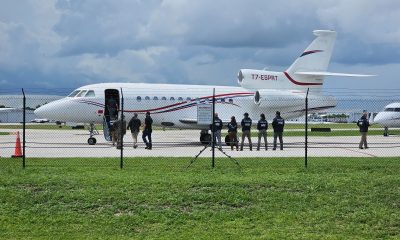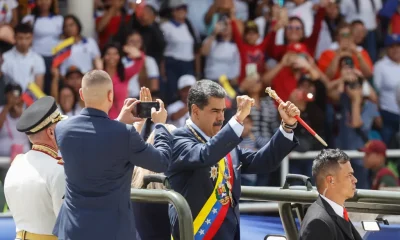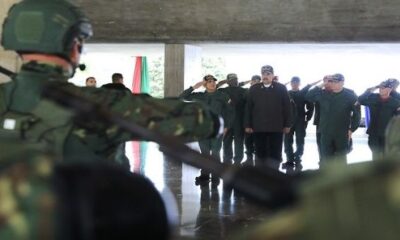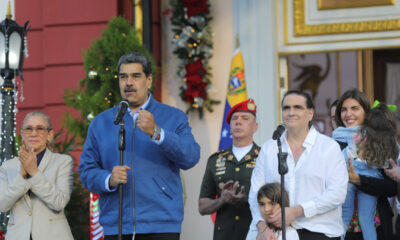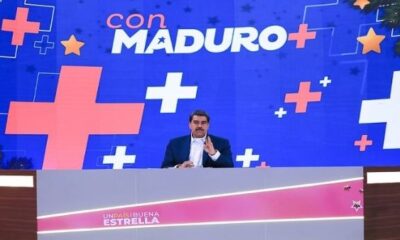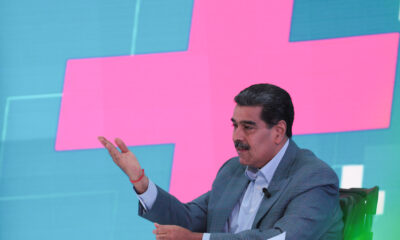International
Venezuelan President welcomes support from leaders calling for lifting of coercive measures
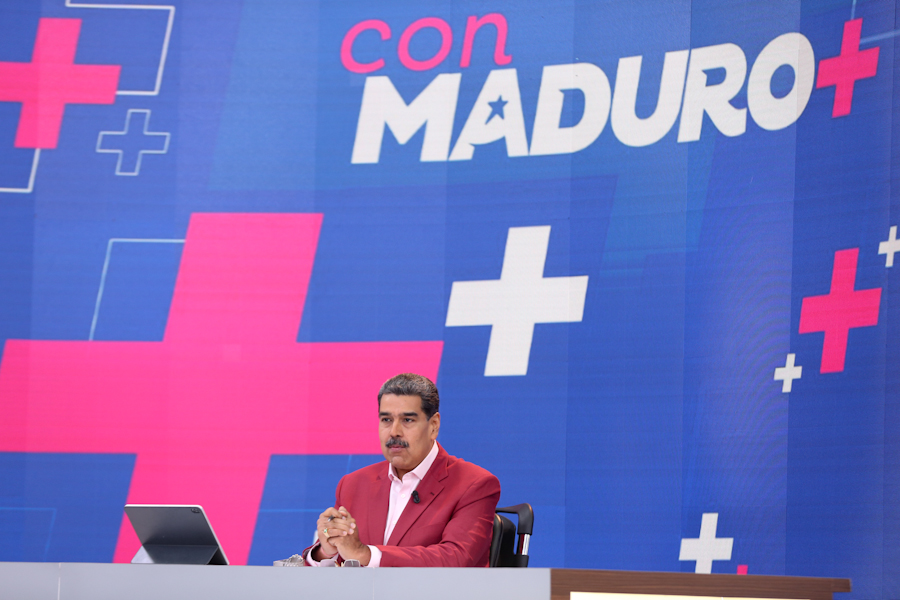
October 24 |
The president of Venezuela, Nicolás Maduro, thanked on Monday the support that Latin American and Caribbean leaders gave to the demands for the lifting of the unilateral coercive measures of the United States against his country, at the Palenque Meeting, in Mexico.
During his intervention in the television program Con Maduro Más, the dignitary highlighted that he shared with presidents and prime ministers and heads of delegation of 10 nations that met to dialogue on vital issues for the development of the nations involved.
“We are deeply grateful to the Government of Mexico, to the people of Mexico, for all the attentions, all the affection we have received in this summit of good neighborliness and for the well-being of our America”, he said.
In this sense, the dignitary assured that the Palenque Meeting was impregnated with the history of the ancestral Mayan culture, which invites us to think about the accumulated struggles and the current generations as a result.
“From all the cosmovision of these centuries of struggle, of life, of resistance, we are here. We are the result of those causes, of that life, of a whole grandiose history,” he said.
The Venezuelan president assured that the Palenque Meeting: For a fraternal neighborhood with well-being ratifies that the Venezuelan people are on the right side of history.
Nicolás Maduro refers to the agreements signed with the opposition in Barbados
The head of state specified that with the signing of the agreements with the opposition in Barbados, his government is once again betting on peace, respect and tolerance , following the postulates of the Venezuelan Constitution and laws.
“If it is necessary to sign with the devils for the peace and progress of Venezuela, we sign, in the name of God, the people and our homeland”, he stressed.
The President urged the opposition to enter the lane of respect and tolerance within the framework of the Constitution, and stop conspiring and asking for sanctions against the country.
He assured that the Barbados agreements are expected to have good results, and specified that, on the part of the Government, nothing will be done to damage it.
“This agreement allowed the activation of a set of agreements that have been discussed with the Government of the United States, as it is already known. A Return to the Homeland plan was then activated with two airplanes”, he said.
Maduro detailed that last Wednesday and Monday two planes arrived in Venezuela with nationals from the United States, who were mistreated in prisons of that country as if they were criminals or terrorists.
He denounced the networks of coyotes led by some members of the Venezuelan opposition, who incite people to emigrate to the U.S. and, when they arrive, they are imprisoned in subhuman conditions.
“Do not believe in false tales of the American dream. How many compatriots are enslaved abroad? The first Return to the Homeland flight urgently requested by the U.S. Government was activated”, he said.
He commented that in the context of the dialogues with the opposition in Barbados, the United States announced the beginning of a path that must be permanent and sustained that must lead to the total lifting of the unilateral coercive sanctions on Venezuela.
President Maduro welcomes the approval of the questions of the referendum on the Essequibo
The Venezuelan president also welcomed the questions to be included in the referendum on the Essequibo, after they were unanimously approved this Monday by the National Electoral Council (CNE).
Maduro emphasized that in the South American country, major issues of national interest are consulted to the people, and affirmed that Venezuela is the protagonist of true participative democracy.
Previously, in his social network account X, he had called Venezuelans to vote five times yes next December 3.
“We greet with great satisfaction the authorities of the National Electoral Council for the approval of the five questions that will be asked to Venezuelans in the Consultative Referendum in defense of Essequiba Guyana,” he wrote.
Head of State sends solidarity to the Palestinian people
Nicolás Maduro also sent his solidarity to the Palestinian people and called for a halt to Israel’s genocide against the population of Gaza.
Likewise, he insisted on the need to establish a world conference that would allow the establishment of a negotiation to return the rights to peace, territory, independence and a state of their own to the Palestinian people.
“From Venezuela we demand that, and we are going to achieve it with the peoples of the world”, he assured.
International
DHS Secretary Kristi Noem’s Purse Stolen in D.C. Restaurant Heist

The purse of Kristi Noem, Secretary of the Department of Homeland Security, was stolen on Sunday night at a restaurant in Washington, D.C., Fox News Digital confirmed through several agency sources.
The handbag, taken by a white male wearing a mask, reportedly contained $3,000 in cash along with personal documents, including her passport, keys, driver’s license, and DHS badge, according to an agency spokesperson.
“Her entire family was in town, including her children and grandchildren. She was celebrating her retirement by treating them to dinner, activities, and Easter gifts,” the spokesperson added.
Crime continues to be a significant issue in the U.S. capital, particularly theft. However, violent crime reached its lowest level in 30 years last year, according to the Office of the Attorney General at the time.
International
Pope Francis: The Quiet Architect Behind the U.S.-Cuba Thaw
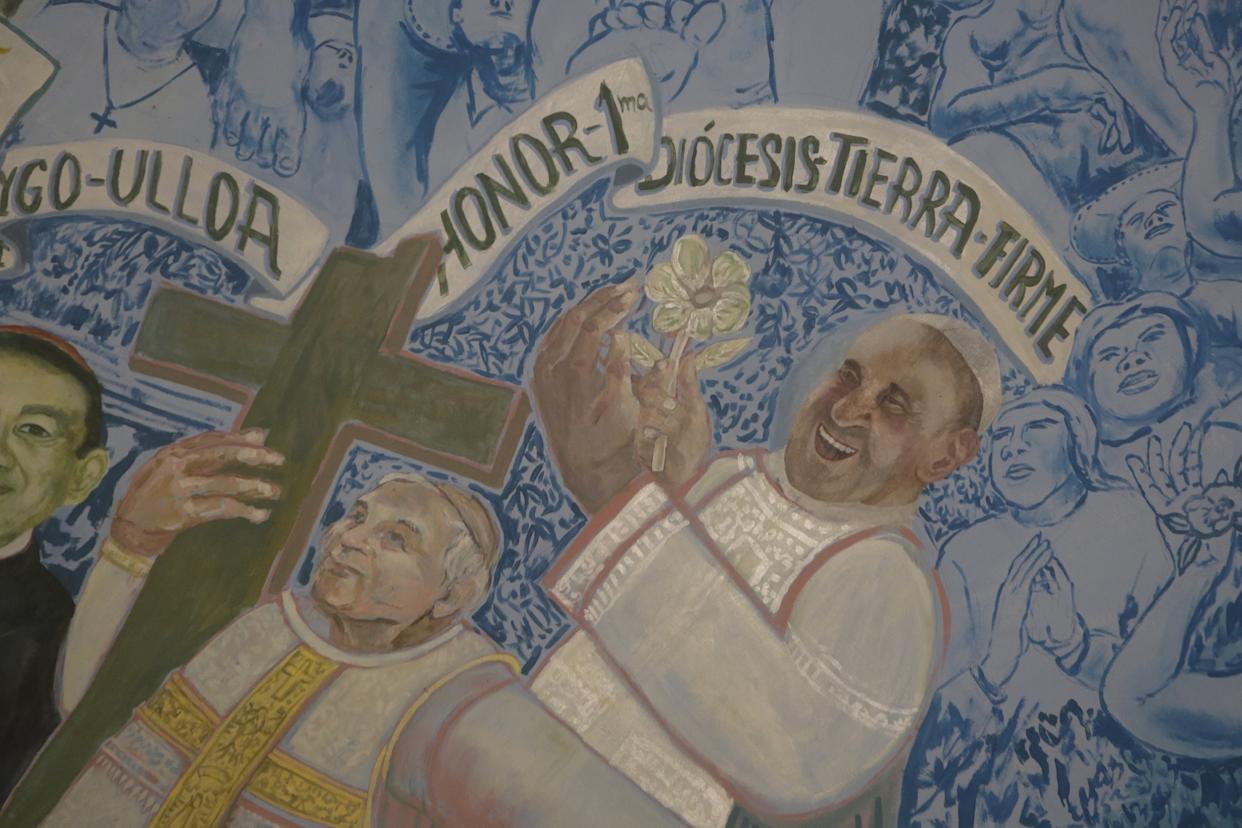
When then-U.S. President Barack Obama and Cuban President Raúl Castro announced the reestablishment of diplomatic relations in December 2014—after decades of hostility—there was a third figure present in both speeches: Pope Francis.
This thaw in U.S.-Cuba relations—later reversed by Donald Trump—was the result of behind-the-scenes negotiations personally encouraged by Pope Francis, who passed away on Monday at the age of 88, just over a year after becoming head of the Catholic Church.
Upon learning the news of the breakthrough, the pontiff humbly stated, “This was made possible thanks to the ambassadors and to diplomacy,” which he called “a noble, very noble job.”
In 2015, months after the announcement, Raúl Castro visited the Vatican and met with the pope. Over time, Castro developed a fondness for Francis that he never had for his predecessors, Benedict XVI and John Paul II. “If the Pope continues talking like this, sooner or later I’ll start praying again and return to the Catholic Church—and I’m not joking,” said the younger Castro, who, like his brother Fidel (1926–2016), had been educated by Jesuits—the same order to which Pope Francis belonged.
Pope Francis visited Cuba later that year. Just days before his arrival, the Cuban government announced the pardon of 3,522 common prisoners as an act of clemency.
While in Havana, the pope met with Fidel Castro, who gave him a first edition of the book Fidel and Religion by Brazilian friar and liberation theologian Frei Betto.
Criticism from the Opposition
Francis’s diplomatic approach also drew criticism from parts of the Cuban opposition. In a 2022 interview with Univision, the pope revealed he had “a human relationship” with Raúl Castro.
International
Dominican Republic Declares Three Days of Mourning for Pope Francis

Dominican Republic President Luis Abinader has declared three days of national mourning starting Tuesday following the death of Pope Francis, who passed away on Monday at the age of 88 in his residence at the Casa Santa Marta.
In an official decree, Abinader highlighted the pope’s legacy “as a global leader who promoted significant reforms within the Catholic Church and was known for his humility, openness to dialogue, and commitment to peace among nations.”
During the mourning period, the national flag will be flown at half-staff at military facilities and public buildings.
According to a statement from the Office of the Presidency, although Pope Francis never visited the Dominican Republic during his papacy, he maintained a close relationship with the country. He expressed solidarity and empathy during difficult times, including offering prayers for the victims of the recent tragedy at a Santo Domingo nightclub on April 8, which claimed 232 lives and left more than 180 injured.
-

 Central America4 days ago
Central America4 days agoNicaraguan Exiles to Mark 7th Anniversary of 2018 Protests with Global Commemorations
-

 International4 days ago
International4 days agoDominican ‘False Hero’ Arrested for Faking Role in Nightclub Collapse That Killed 231
-

 International3 days ago
International3 days agoACLU seeks emergency court order to stop venezuelan deportations under Wartime Law
-

 Central America3 days ago
Central America3 days agoUN complaint filed against Costa Rica over detention of migrant children
-

 International2 days ago
International2 days agoThousands rally nationwide against Trump’s threat to U.S. democracy
-

 Central America1 day ago
Central America1 day agoSenator Van Hollen Meets with Deported MS-13 Member in El Salvador; Trump and Bukele React
-

 International1 day ago
International1 day agoPope Francis Appears for Easter Blessing, Calls for Peace and Religious Freedom
-

 Central America8 hours ago
Central America8 hours agoCardinal Rodríguez to Attend Funeral of Pope Francis: “He Was Very Dear to Me”
-

 Central America8 hours ago
Central America8 hours agoNicaragua’s Ortega and Murillo Mourn Pope Francis, Acknowledge ‘Difficult’ Relationship
-

 International8 hours ago
International8 hours agoDominican Republic Declares Three Days of Mourning for Pope Francis
-

 International8 hours ago
International8 hours agoDHS Secretary Kristi Noem’s Purse Stolen in D.C. Restaurant Heist
-

 International8 hours ago
International8 hours agoPope Francis: The Quiet Architect Behind the U.S.-Cuba Thaw














